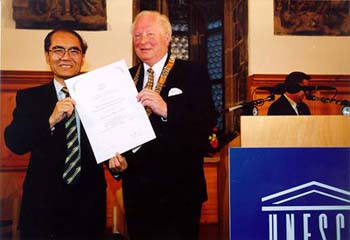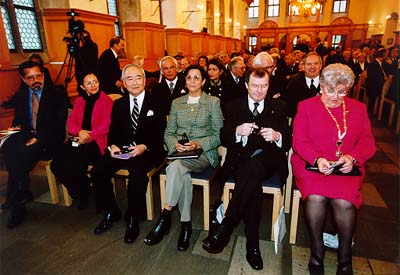- TOP
- 資料館
- FOCUS
- June 2001 - Volume 24
- UNESCO Prize for Human Rights Education
FOCUS June 2001 Volume 24
UNESCO Prize for Human Rights Education
UNESCO instituted the UNESCO Prize for Human Rights Education in 1978 to mark the 30th anniversary of the Universal Declaration of Human Rights, and to further promote human rights and fundamental freedoms through education. The Prize is awarded every two years to "institutions, organizations and individuals who have made particularly significant contribution to the development of human rights education, on the basis of the principles set forth in international standard-setting instruments on human rights. "1
The twelfth UNESCO Prize for Human Rights Education (for the year 2000) received 56 nominations from Africa, America, Asia and Europe, with 32 individual and 24 collective nominations.
The 2000 Prize was awarded to the City of Nuremberg for its "City of Peace and Human Rights" concept. The city's contribution to the promotion of human rights include the creation of a Human Rights Documentation Center, the Nuremberg International Human Rights Award (Samuel Ruiz Garcia, former bishop of Chiapas in Mexico, is this year's awardee); and an International Human Rights Film Festival. The city's 1993 art piece named "The Way of Human Rights" is given much praise for inspiring school children and youngsters to create projects that promote awareness of human rights. The art piece made by an Israeli artist has 29 pillars. Each pillar corresponds to one article in the Universal Declaration of Human Rights. One language is used for each pillar.
A Documentation Center is being established in an unfinished Nazi party rally ground that was designed to accommodate 60,000 people. The center aims to hold big public gatherings there.
UNESCO appreciated the massive involvement of children and adults in the city to transform it into a City of Peace and Human Rights. Considering its role in the second world war in Europe, the city is now working to "help new generations in keeping the memory of the historical facts of the past and to move forward to find answers for the future. " 2
The Director-General of UNESCO stressed that the many human rights activities of the city
are designed specifically for schoolchildren and young people in order to inculcate in them attitudes and behavioural patterns that are based on the principles of mutual respect, non-discrimination and tolerance, as well as to encourage their commitment to the cause of human rights. At the same time, the City gives special emphasis to research and reflection. In the framework of the conferences it organizes, concrete ways and means are sought to combat and prevent prejudice, hatred and discrimination, which are perennial sources of conflict and violence. 3

[ Nuremberg City mayor accepting the UNESCO Prize ]
Three Honorable Mentions were also awarded. One was given to Ms. Flor Alba Romero for her educational activities involving vulnerable groups in Colombia including the teaching of the rights of children, the rights of women, and writing books. Another was given to the Associated Schools Project in Pakistan for the introduction of education for human rights as part of extra-curricular subject in 250 schools, and for developing human rights teaching materials. And a third Honorable Mention was given to HURIGHTS OSAKA.
HURIGHTS OSAKA is cited for its work based on the objectives of the United Nations Decade for Human Rights Education. Ms. Dina Rodriguez Montero, who is the President of the International Jury, said that HURIGHTS OSAKA
carried out valuable research as well as. .. organized successful conferences, training activities and workshops aimed at the education of professionals, grassroots workers and school children. Their publications have been widely disseminated at the national and regional levels, as has the knowledge they have gained from these experiences. 4
The Director-General of UNESCO, on the other hand, said that
HURIGHTS OSAKA is particularly devoted to promoting human rights education in schools in order to prepare well-informed, democratically minded and responsible citizens to live in an environment free of violence, discrimination and intolerance. To this end, it cooperates closely with various actors within civil society, including research and training institutions, other non-governmental organizations, and national institutions. I hereby pay tribute to its vision and its achievement in making human rights education an integral part of education. 5
Previous winners of the UNESCO Prize for Human Rights Education include Justice Michael Kirby of the High Court of Australia (1988), Jean Bertrand Aristide (1996); the Philippine Commission of Human Rights and Chilean academic Jose Zalaquett Daher (1994), the Arab Institute of Human Rights in Tunisia (1992), and Czech leader Vaclav Havel (1990). 6
The International Jury for the UNESCO Prize for Human Rights Education 2000, headed by Ms. Dina Rodriquez Montero of Peru who now works for the University for Peace in Costa Rica, had the following members: Professor Abdelfattah Amor of Tunisia, Ms. Mercedes Contreras of the Philippines, Professor Guido Gerin of Italy, Professor Nasila Rambe of Tanzania, and Professor Rumen Valchev of Bulgaria.
Awarding ceremonies were held in the City of Nuremberg last April 21, 2001.

[ UNESCO awardees and representatives in the Nuremberg ceremonies ]
Significance of the award
The Honorable Mention award for HURIGHTS OSAKA is both a recognition and a challenge. It is a recognition of the work that has been done at domestic and regional levels. But while the work done so far is not enough to fill the need for human rights education, it is still considered important in light of the objectives of the UN Decade for Human Rights Education (1995-2004). It is a challenge because it tells HURIGHTS OSAKA that from this time on it is expected to do more. It cannot rest on what it had done. It has to proceed further in order to continue the never-ending task of promoting human rights.
HURIGHTS OSAKA has limited resources. It can only do so much. But it has to perform within this limitation as expected by its various supporters from the local governments of Osaka to the NGOs and finally to the ordinary people in the community, and by its partners in the region.
Endnotes
- Speech of Koichiro Matsuura, Director-General of UNESCO, during the awarding ceremonies in the City of Nuremberg on April 21, 2001.
- Speech of Dina Rodriguez Montero during the awarding ceremonies in the City of Nuremberg on April 21, 2001.
- Matsuura, op. cit.
- Rodriguez, op. cit.
- Matsuura, op. cit.
- UNESCO Press,www.unesco.org/opi/eng/unescopress/2000/00-136e.shtml
